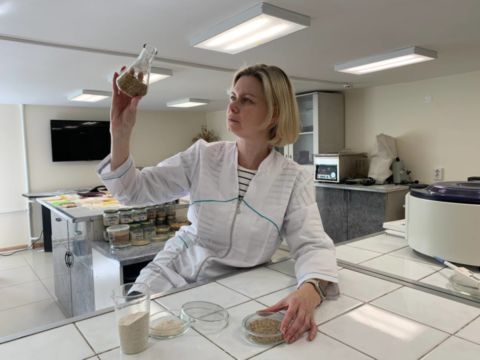A method for making bread from sprouted barley has been patented by researchers from the SUSU School of Medical Biology. Barley (commonly known as pearl barley) is considered the oldest cultivated plant and is even mentioned in the Bible. Bread obtained at the university has high antioxidant activity and is baked thirty minutes faster.
The preparation of starters in bakery production is considered a complex process, because their formation and development of useful microflora in them takes a lot of time. Scientists from the Department of Food Technology and Biotechnology of South Ural State University were able to reduce the time of technological production of bread by using lactic acid bacteria and a unique yeast starter, which is subsequently added to the finished dough sour.
The peculiarity of bread with improved consumer properties by Chelyabinsk developers is that a sourdough based on whole-milled flour from sprouted barley grain is used in the product recipe. The nutritious sugars contained in such flour become biologically more accessible for the beneficial lactic acid bacteria introduced into the sourdough; microorganisms develop more intensively, accelerating both the maturation of the mixture and the fermentation of the dough itself. The entire technological process of making bread using such sourdough becomes faster by half an hour, compared to traditional sponge dough technology.
It is important that the bread-making production line remains virtually unchanged: the prepared sourdough is mixed with first-grade wheat flour, salt and water, after which standard dough is prepared, fermented, cut, proofed, and the bread is baked.
"We introduce 15% of the raw ingredient we have developed from the mass fraction of all wheat flour in bread, enriching it with dietary fibres, micro- and macroelements, increasing the antioxidant properties of the product," said Natalia Naumenko, Professor of the SUSU Department of Food Technology and Biotechnology. "That is, we create a more useful product with well-developed microflora, porosity, beautiful appearance and without any additional improvers. At the same time, its cost remains the same. And the maturation of both the starter and the dough itself happens faster due to the properties of barley. We carry out its controlled germination. In this way, we achieve an improvement in its antioxidant properties. We achieve that some of the sugars and starch are converted into simpler sugars. Accordingly, the fermentation of the starter happens quite quickly. Another feature of our raw ingredient is that such a starter is in a semi-finished state and is stored dry. It only remains to dilute it with water and wait for it to mature without preliminary mixing of ingredients. The manufacturer can prepare the amount of sourdough that he needs daily, without monitoring it in an endless technological process, which is also valuable with a flexible sales schedule and assortment. The manufacturers do not need to control the activity and freshness of the sourdough, they simply mix the dry ingredient, lactobacilli, baker's yeast with water, prepare the sourdough from this mixture, and then form the finished dough."
Such bread has better fermentation properties, which means that the protein in its composition has developed its matrix well, due to which the nutrient is fully absorbed by the body; intensification of the fermentation process in a natural way allows to increase the digestibility of all useful substances from the product. In addition, the bakery product is stored longer without losing its elasticity and pleasant consumer qualities.
The technology for producing dry sourdough for specialized enterprises engaged in grain processing products is simple. Barley grain is soaked and germinated for up to forty hours in strictly controlled conditions so that the enzymes are activated in sufficient quantities. After the germination process is stopped, the grain is dried using forced convection and ground into flour.
The ingredient can be stored for quite a long time in such a crushed form. The developers recommend placing the flour from sprouted barley in a vacuum package to avoid rancidity of the fats contained in the germ of the processed grain.
All antioxidants in bread are formed during germination of barley grain. The process of releasing antioxidants during germination of grain was intensified by SUSU scientists using ultrasound treatment at the soaking stage. Ultrasonic treatment increases the permeability of all grain layers for moisture, which helps reduce germination time, better structure all components of a single grain and improve the antioxidant properties of the processed raw materials.
Sprouted barley becomes more antioxidant active by about 10% as compared to the initial values, and after its ultrasonic treatment, the overall usefulness increases by another 37%, with the content of flavonoids increased sevenfold and polyphenolic compounds increased twofold. Bread, which includes whole-grain flour from such sprouted barley, becomes a particularly useful product-basis of a diet.
The research was supported by a grant from the Russian Science Foundation and the Ministry of Education and Science of Russia within the framework of the Science and Universities national project.




